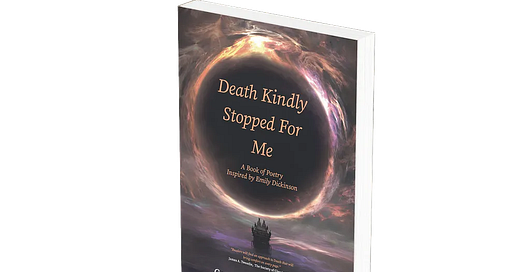
"Unable are the Loved to die for Love is Immortality" ~ Emily Dickinson.
Happy New Year to you all, my wonderful subscribers . . . I wish you all well and may all your resolutions come to pass!
Please note that my amazon.com book page now features the same detailed content in the From the Publisher section as my amazon.ca page. On both pages now, when you scroll past my book cover at the top, you will see all sorts of fun reviews and illustrations and poem quotes, all taken directly from my book. Just a little taste of what’s inside the book itself!
My poems, My Soul Is at Home in the Depths of the Ocean (page 141) and In the Gloaming Shrewd Death Steals Aloft (page 57) from my book, Death Kindly Stopped For Me, are being featured TODAY!! on The Society of Classical Poets’ daily poetry website (classicalpoets.org, January 15). Please go online and check them out when you have a moment. My thanks go out to SCP President Evan Mantyk for featuring my poems in the daily poetry section of the website. Here is the first featured poem from my book.
My Soul Is at Home in the Depths of the Ocean
My soul is at home in the depths of the ocean;
My soul is at home in the cosmos above,
Always adventuring, seeking to grow and
Wreathing my body in infinite love.
My soul permeates every stone on our Earth,
Every plant, every pod, every intricate cave.
My soul permeates every star of our universe,
Each atom of galaxies beautifully made.
My soul befriends others, my constant companions
In bubbling joy of creational flair,
At home in dimensions of endless proportions
Traveling timelessly, yet ever here.
Corey Elizabeth JacksonWhen I reread my poem, I reflect on a connection that I saw between it and a poem by Emily Dickinson, There is a solitude of space, which was featured recently on the Emily Dickinson Daily public group on Facebook:
There is a solitude of space
A solitude of sea
A solitude of death, but these
Society shall be
Compared with that profounder site
That polar privacy
A soul admitted to itself-
Finite InfinityIn this poem, Dickinson’s itemizes three backdrops for solitude: space, sea and death. In a provocative twist, the speaker in this poem actually considers these as “society” when viewed in comparison to an even profounder kind of solitude, which I will discuss in a moment.
In my own poem, My Soul Is at Home in the Depth of the Ocean, the realms of space and sea where the soul travels are specifically explored, as are the realms of Earth, “every stone on our Earth, Every plant, every pod, every intricate cave”. I feel that my poem in the last verse neatly converges with Dickinson’s description of these realms as “society”. The soul in my poem, in fact, openly embraces a rapturous connection of my soul with others . . . “my constant companions”. My poem embraces both solitude and society alike. Dickinson’s description of death in her poem as being both a “solitude” as well as a “society” remind me of my own vision of death in my book. In some of my poems, Death can be considered a friend, but the solitude of Death is also pervasive, as each soul must partake its own individual journey thereafter.
In the last half of her poem, Dickinson’s examples of space, sea and death as possessing a solitude for the soul suddenly pale upon the speaker’s forceful description of a “profounder site” for the soul. Now, in stark comparison, these examples are not solitude, but rather are “society”, for D.’s speaker has plunged far deeper into where the soul may go, that is, to “that polar privacy . . . A soul admitted to itself”. What do these baffling lines mean? I find the comments of one of the Facebook group members to be instructive. She suggests that in these lines she is reminded of a recent poem quoted on the site in which “the soul is (almost?) two souls. One is the soul, and “the other is the soul that knows it is a soul.” In this context, I envision the soul in its primary state as two “polar” opposites which pulse and glow in a magnetic kind of bond at the very deepest level, in the “privacy” of every enlightened being. This interpretation makes clearer to me the last almost inscrutable line: “finite infinity”. One soul is finite, I conjecture, and is also self-aware, knowing itself as a miniscule fractal of its counterpart soul that is infinite, at one with ultimate Source.
I like to think that the second last line in my own soul poem above, the soul “at home in dimensions of endless proportions” reflects, in some small way, this dichotomy of the “polar privacy” of Dickinson’s speaker’s soul. When the soul can be at home anywhere in space and time, then its “polar privacy” must inherently exist!






Good to see some publicity on the book Corey.